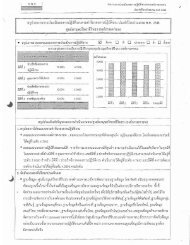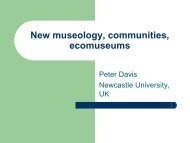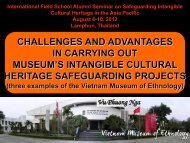Download
Download
Download
You also want an ePaper? Increase the reach of your titles
YUMPU automatically turns print PDFs into web optimized ePapers that Google loves.
Voices from the Field:Documenting Kantreumand Language Rights in Surin Provinceby Majid BagheriMr. Majid Bagheri is an Iranian filmmaker and video artist who is interested in performance art, installation art,documentary, and narrative cinema. In 2011, he finished his Master’s degree at the School of Interactive Artsand Technology at Simon Fraser University and subsequently spent six months in Thailand supporting filmproduction at the SAC (December 2011-May 2012).“Without the revitalization of Khmerlanguage skills among the youngergenerations of ethnic Khmer, therewas little chance that this genrewould exist in the near future.”In December2011, I arrived inBangkok to begin mywork with the SirindhornAnthropology Centre.In addition to providingtechnical support to theaudiovisual team at SAC,one of my main tasks was to assist with the production of afilm documenting the local perspectives and preservationefforts of Northern Khmer musical forms, particularly amusical genre called kantreum.The film project was part of the Culture and Rightsin Thailand project at SAC, and was managed by Dr.Peter Vail, an anthropologist from the National Universityof Singapore, and Mr. Chaimongkol Chalermsukjitsri, alocal researcher and coordinator. Since 2009, Dr. Vail andMr. Chaimongkol had undertaken collaborative research inSurin province to understand the vital links between ethnicKhmer language and the transmission and preservationof the musical genre of kantreum. I was there to supportthem in the production of a film about the loss of theKhmer language and its impact on traditional musicalexpressions.Even though I had read numerous articles andtheses about the ethnic Khmer in Thailand’s northeasternprovinces, when I arrived in Surin, I realized that Iknew next to nothing about the ethnic Khmer and theirculture. For example, I had expected to find more overtand visible expressions ofKhmer ethnic identity, butinstead I encountered ageneral indifference andsome opposition towardsany such identifications.From talking with Dr. Vailand Mr. Chaimongkol, Icame to understand that this widespread reluctance toidentify openly as ethnically “Khmer” was partly due to thegeneral regard of the central Thai language as the routeto prosperity, and partly a result of the stigma associatedwith Khmerness given the history of Khmer Rouge inCambodia. I had also underestimated the impact of theglobal cultural industry on rural areas, and was surprisedat how the cultural preferences of the youth were shapedby these global influences, marginalizing the traditionalcultural expressions to the point of extinction.Mr.Chaimongkol teaching English andKhmer at a local monastery







